欧盟-GDPR适用地域指南(英文)-2019.11.12-28页
- 格式:pdf
- 大小:727.11 KB
- 文档页数:28

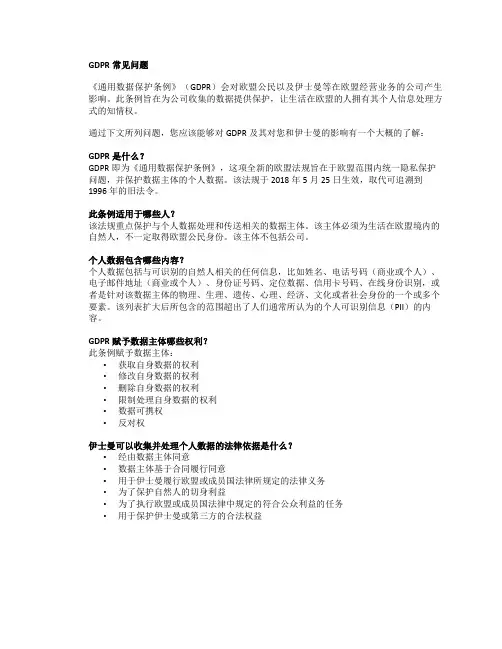
GDPR常见问题《通用数据保护条例》(GDPR)会对欧盟公民以及伊士曼等在欧盟经营业务的公司产生影响。
此条例旨在为公司收集的数据提供保护,让生活在欧盟的人拥有其个人信息处理方式的知情权。
通过下文所列问题,您应该能够对GDPR及其对您和伊士曼的影响有一个大概的了解:GDPR是什么?GDPR即为《通用数据保护条例》,这项全新的欧盟法规旨在于欧盟范围内统一隐私保护问题,并保护数据主体的个人数据。
该法规于2018年5月25日生效,取代可追溯到1996年的旧法令。
此条例适用于哪些人?该法规重点保护与个人数据处理和传送相关的数据主体。
该主体必须为生活在欧盟境内的自然人,不一定取得欧盟公民身份。
该主体不包括公司。
个人数据包含哪些内容?个人数据包括与可识别的自然人相关的任何信息,比如姓名、电话号码(商业或个人)、电子邮件地址(商业或个人)、身份证号码、定位数据、信用卡号码、在线身份识别,或者是针对该数据主体的物理、生理、遗传、心理、经济、文化或者社会身份的一个或多个要素。
该列表扩大后所包含的范围超出了人们通常所认为的个人可识别信息(PII)的内容。
GDPR赋予数据主体哪些权利?此条例赋予数据主体:•获取自身数据的权利•修改自身数据的权利•删除自身数据的权利•限制处理自身数据的权利•数据可携权•反对权伊士曼可以收集并处理个人数据的法律依据是什么?•经由数据主体同意•数据主体基于合同履行同意•用于伊士曼履行欧盟或成员国法律所规定的法律义务•为了保护自然人的切身利益•为了执行欧盟或成员国法律中规定的符合公众利益的任务•用于保护伊士曼或第三方的合法权益GDPR会影响到哪些人?与生活在欧盟的员工、承包商、供应商和客户打交道的任何人。
根据GDPR,伊士曼要承担哪些责任?伊士曼必须确保以合法、公平且透明的方式处理个人数据。
任何个人数据的收集都必须出于具体、明确且合法的理由。
个人数据的收集应仅限于必要的范围内。
为了满足此要求,伊士曼需要了解•哪些个人数据正被收集•个人数据存储在何处•个人数据的存储期限(或决定该存储期限的标准)•处理(使用)个人数据的目的•处理个人数据的合法依据•谁有权查阅个人数据(包括第三方)•如何保护个人数据。
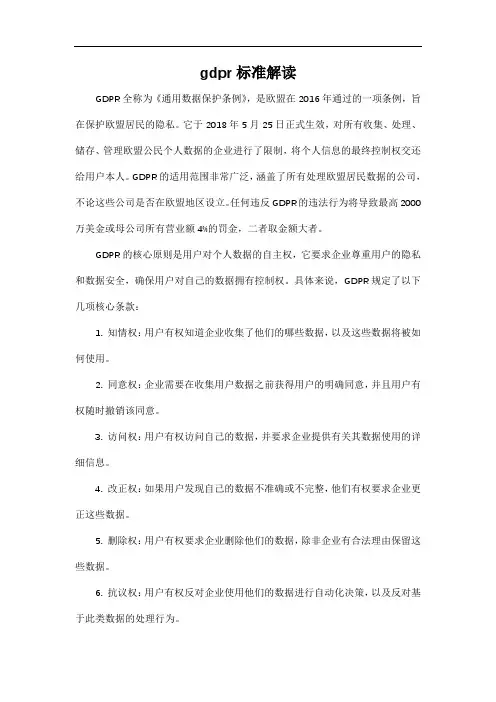
gdpr标准解读GDPR全称为《通用数据保护条例》,是欧盟在2016年通过的一项条例,旨在保护欧盟居民的隐私。
它于2018年5月25日正式生效,对所有收集、处理、储存、管理欧盟公民个人数据的企业进行了限制,将个人信息的最终控制权交还给用户本人。
GDPR的适用范围非常广泛,涵盖了所有处理欧盟居民数据的公司,不论这些公司是否在欧盟地区设立。
任何违反GDPR的违法行为将导致最高2000万美金或母公司所有营业额4%的罚金,二者取金额大者。
GDPR的核心原则是用户对个人数据的自主权,它要求企业尊重用户的隐私和数据安全,确保用户对自己的数据拥有控制权。
具体来说,GDPR规定了以下几项核心条款:1. 知情权:用户有权知道企业收集了他们的哪些数据,以及这些数据将被如何使用。
2. 同意权:企业需要在收集用户数据之前获得用户的明确同意,并且用户有权随时撤销该同意。
3. 访问权:用户有权访问自己的数据,并要求企业提供有关其数据使用的详细信息。
4. 改正权:如果用户发现自己的数据不准确或不完整,他们有权要求企业更正这些数据。
5. 删除权:用户有权要求企业删除他们的数据,除非企业有合法理由保留这些数据。
6. 抗议权:用户有权反对企业使用他们的数据进行自动化决策,以及反对基于此类数据的处理行为。
为了确保GDPR的实施,欧盟委员会设立了一套严格的监管机制,包括罚款、公开谴责、产品下架等措施。
此外,GDPR还要求企业定期进行数据保护影响评估,以确保其数据处理活动符合法规要求。
总的来说,GDPR是一个非常全面的数据保护法规,旨在为用户提供更高水平的隐私保护。
虽然它给企业带来了额外的合规成本,但它也为企业提供了一个机会,使其能够在全球范围内展示其对数据保护的承诺和能力。
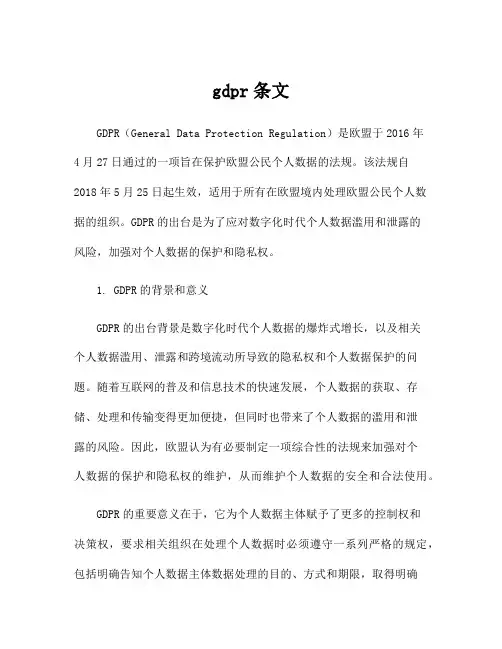
gdpr条文GDPR(General Data Protection Regulation)是欧盟于2016年4月27日通过的一项旨在保护欧盟公民个人数据的法规。
该法规自2018年5月25日起生效,适用于所有在欧盟境内处理欧盟公民个人数据的组织。
GDPR的出台是为了应对数字化时代个人数据滥用和泄露的风险,加强对个人数据的保护和隐私权。
1. GDPR的背景和意义GDPR的出台背景是数字化时代个人数据的爆炸式增长,以及相关个人数据滥用、泄露和跨境流动所导致的隐私权和个人数据保护的问题。
随着互联网的普及和信息技术的快速发展,个人数据的获取、存储、处理和传输变得更加便捷,但同时也带来了个人数据的滥用和泄露的风险。
因此,欧盟认为有必要制定一项综合性的法规来加强对个人数据的保护和隐私权的维护,从而维护个人数据的安全和合法使用。
GDPR的重要意义在于,它为个人数据主体赋予了更多的控制权和决策权,要求相关组织在处理个人数据时必须遵守一系列严格的规定,包括明确告知个人数据主体数据处理的目的、方式和期限,取得明确的授权同意,保证数据的安全和保密性,以及提供个人数据主体相关的可控权利等。
通过GDPR的实施,可以更好地保护个人数据的隐私和安全,提高个人数据主体的信任度和满意度,促进数字经济的健康发展。
2. GDPR的基本原则和内容GDPR包括一系列的基本原则和内容,主要包括以下几个方面:2.1.个人数据处理的合法性和公正性原则。
根据GDPR的规定,个人数据的处理必须具有合法性和公正性,即必须有明确的法律依据和合理的处理方式,不能以任何不正当的手段获取或使用个人数据,不能违反个人数据主体的意愿和利益。
2.2.个人数据处理的透明性和公开性原则。
根据GDPR的规定,个人数据的处理必须具有透明性和公开性,即相关组织在处理个人数据时必须向个人数据主体明确告知数据处理的目的、方式和期限,并在数据处理前取得明确的授权同意。
2.3.个人数据处理的目的和必要性原则。
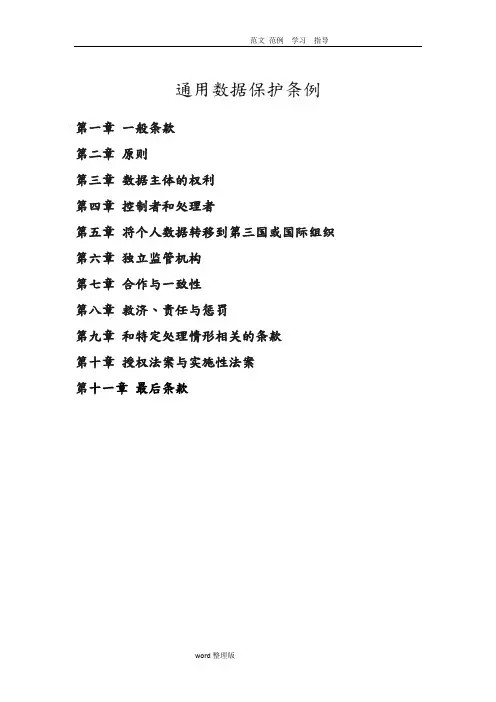
通用数据保护条例第一章一般条款第二章原则第三章数据主体的权利第四章控制者和处理者第五章将个人数据转移到第三国或国际组织第六章独立监管机构第七章合作与一致性第八章救济、责任与惩罚第九章和特定处理情形相关的条款第十章授权法案与实施性法案第十一章最后条款经过欧盟议会长达四年的讨论,欧盟《通用数据保护条例》(General Data Protection Regulation,简称GDPR)终于在2018年5月25日生效。
第一章一般条款第1条主要事项与目标1.本条例制定关于处理个人数据中对自然人进行保护的规则,以及个人数据自由流动的规则。
2.本条例保护自然人的基本权利与自由,特别是自然人享有的个人数据保护的权利。
3.不能以保护处理个人数据中的相关自然人为由,对欧盟内部个人数据的自由流动进行限制或禁止。
第2条适用范围1.本条例适用于全自动个人数据处理、半自动个人数据处理,以及形成或旨在形成用户画像的非自动个人数据处理。
2.本条例不适用以下情形:(a)欧盟法管辖之外的活动中所进行的个人数据处理;(b)欧盟成员国为履行《欧盟基本条约》(TEU)第2章第5款所规定的活动而进行的个人数据处理;(c)自然人在纯粹个人或家庭活动中所进行的个人数据处理;(d) )有关主管部门为预防、调查、侦查、起诉刑事犯罪、执行刑事处罚、防范及预防公共安全威胁而进行的个人数据处理。
3.欧盟机构、实体、办事处和规制机构所进行的个人数据处理,适用(EC)第45/2001条例。
根据本条例第98条,(EC)第45/2001条例和其他适用于此类个人数据处理的欧盟法案应当进行调整,以符合本条例的原则和规则。
4.本条例不影响2000/31/EC指令的适用,特别是2000/31/EC指令第12至15条所规定的中间服务商的责任规则的适用。
第3条地域范围1.本例适用于在欧盟内部设立的数据控制者或处理者对个人数据的处理,不论其实际数据处理行为是否在欧盟内进行。
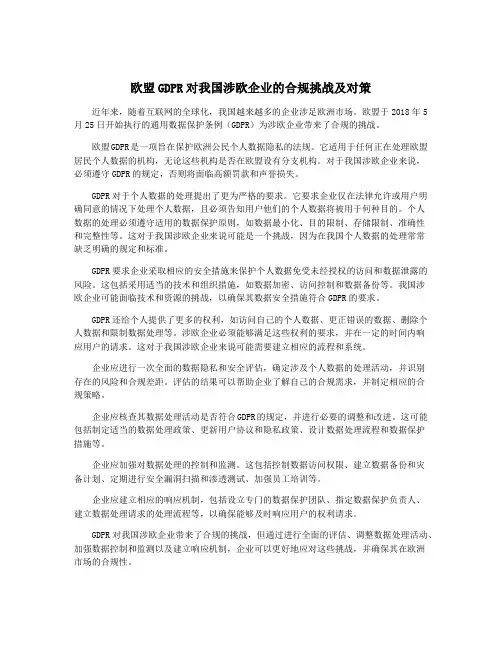
欧盟GDPR对我国涉欧企业的合规挑战及对策近年来,随着互联网的全球化,我国越来越多的企业涉足欧洲市场。
欧盟于2018年5月25日开始执行的通用数据保护条例(GDPR)为涉欧企业带来了合规的挑战。
欧盟GDPR是一项旨在保护欧洲公民个人数据隐私的法规。
它适用于任何正在处理欧盟居民个人数据的机构,无论这些机构是否在欧盟设有分支机构。
对于我国涉欧企业来说,必须遵守GDPR的规定,否则将面临高额罚款和声誉损失。
GDPR对于个人数据的处理提出了更为严格的要求。
它要求企业仅在法律允许或用户明确同意的情况下处理个人数据,且必须告知用户他们的个人数据将被用于何种目的。
个人数据的处理必须遵守适用的数据保护原则,如数据最小化、目的限制、存储限制、准确性和完整性等。
这对于我国涉欧企业来说可能是一个挑战,因为在我国个人数据的处理常常缺乏明确的规定和标准。
GDPR要求企业采取相应的安全措施来保护个人数据免受未经授权的访问和数据泄露的风险。
这包括采用适当的技术和组织措施,如数据加密、访问控制和数据备份等。
我国涉欧企业可能面临技术和资源的挑战,以确保其数据安全措施符合GDPR的要求。
GDPR还给个人提供了更多的权利,如访问自己的个人数据、更正错误的数据、删除个人数据和限制数据处理等。
涉欧企业必须能够满足这些权利的要求,并在一定的时间内响应用户的请求。
这对于我国涉欧企业来说可能需要建立相应的流程和系统。
企业应进行一次全面的数据隐私和安全评估,确定涉及个人数据的处理活动,并识别存在的风险和合规差距。
评估的结果可以帮助企业了解自己的合规需求,并制定相应的合规策略。
企业应核查其数据处理活动是否符合GDPR的规定,并进行必要的调整和改进。
这可能包括制定适当的数据处理政策、更新用户协议和隐私政策、设计数据处理流程和数据保护措施等。
企业应加强对数据处理的控制和监测。
这包括控制数据访问权限、建立数据备份和灾备计划、定期进行安全漏洞扫描和渗透测试、加强员工培训等。
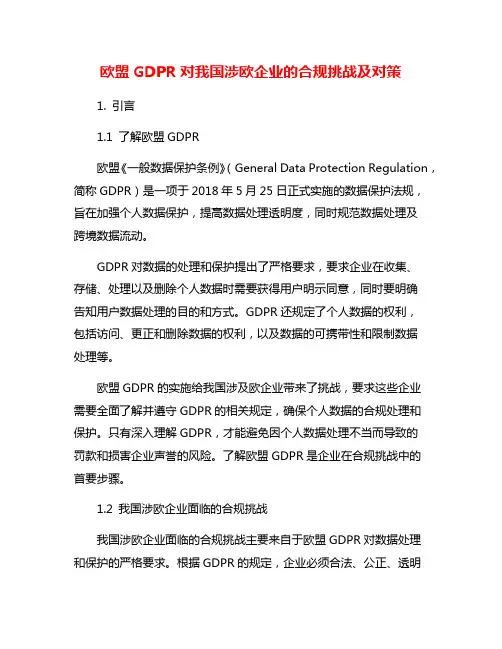
欧盟GDPR对我国涉欧企业的合规挑战及对策1. 引言1.1 了解欧盟GDPR欧盟《一般数据保护条例》(General Data Protection Regulation,简称GDPR)是一项于2018年5月25日正式实施的数据保护法规,旨在加强个人数据保护,提高数据处理透明度,同时规范数据处理及跨境数据流动。
GDPR对数据的处理和保护提出了严格要求,要求企业在收集、存储、处理以及删除个人数据时需要获得用户明示同意,同时要明确告知用户数据处理的目的和方式。
GDPR还规定了个人数据的权利,包括访问、更正和删除数据的权利,以及数据的可携带性和限制数据处理等。
欧盟GDPR的实施给我国涉及欧企业带来了挑战,要求这些企业需要全面了解并遵守GDPR的相关规定,确保个人数据的合规处理和保护。
只有深入理解GDPR,才能避免因个人数据处理不当而导致的罚款和损害企业声誉的风险。
了解欧盟GDPR是企业在合规挑战中的首要步骤。
1.2 我国涉欧企业面临的合规挑战我国涉欧企业面临的合规挑战主要来自于欧盟GDPR对数据处理和保护的严格要求。
根据GDPR的规定,企业必须合法、公正、透明地处理个人数据,保证数据的安全和机密性。
这对于一些在数据处理和保护上存在不足的我国企业来说是一项较大的挑战,需要他们进行系统的改进和升级。
GDPR还规定了个人数据跨境传输的限制,企业需要确保在数据传输过程中符合严格的要求,这对于一些依赖跨境数据传输的企业来说也是一项考验。
GDPR对违规行为的处罚和制裁机制十分严格,一旦企业违反规定将面临高额罚款和声誉损失。
我国涉欧企业需要加强对GDPR的理解和遵守,并采取有效的对策来提升数据安全管理和保护措施,以确保符合GDPR的要求,避免因违规而受到处罚和损失。
2. 正文2.1 数据处理和保护要求数据处理和保护要求是欧盟GDPR的核心内容之一,对我国涉欧企业来说,合规挑战也主要集中在数据处理和保护方面。
根据GDPR 的规定,企业在处理个人数据时必须遵守一系列严格的要求,以确保数据的安全和隐私。
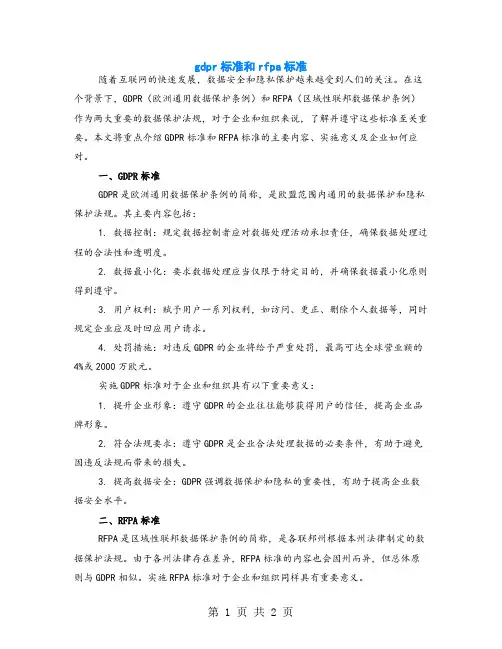
gdpr标准和rfpa标准随着互联网的快速发展,数据安全和隐私保护越来越受到人们的关注。
在这个背景下,GDPR(欧洲通用数据保护条例)和RFPA(区域性联邦数据保护条例)作为两大重要的数据保护法规,对于企业和组织来说,了解并遵守这些标准至关重要。
本文将重点介绍GDPR标准和RFPA标准的主要内容、实施意义及企业如何应对。
一、GDPR标准GDPR是欧洲通用数据保护条例的简称,是欧盟范围内通用的数据保护和隐私保护法规。
其主要内容包括:1. 数据控制:规定数据控制者应对数据处理活动承担责任,确保数据处理过程的合法性和透明度。
2. 数据最小化:要求数据处理应当仅限于特定目的,并确保数据最小化原则得到遵守。
3. 用户权利:赋予用户一系列权利,如访问、更正、删除个人数据等,同时规定企业应及时回应用户请求。
4. 处罚措施:对违反GDPR的企业将给予严重处罚,最高可达全球营业额的4%或2000万欧元。
实施GDPR标准对于企业和组织具有以下重要意义:1. 提升企业形象:遵守GDPR的企业往往能够获得用户的信任,提高企业品牌形象。
2. 符合法规要求:遵守GDPR是企业合法处理数据的必要条件,有助于避免因违反法规而带来的损失。
3. 提高数据安全:GDPR强调数据保护和隐私的重要性,有助于提高企业数据安全水平。
二、RFPA标准RFPA是区域性联邦数据保护条例的简称,是各联邦州根据本州法律制定的数据保护法规。
由于各州法律存在差异,RFPA标准的内容也会因州而异,但总体原则与GDPR相似。
实施RFPA标准对于企业和组织同样具有重要意义。
三、企业如何应对对于企业来说,了解并遵守GDPR标准和RFPA标准是一项艰巨的任务,但并非不可能。
以下是企业应对GDPR标准和RFPA标准的建议:1. 设立专门的数据保护团队:企业应设立专门的数据保护团队,负责处理与数据保护和隐私相关的事务,确保企业数据处理活动的合法性和合规性。
2. 培训员工:企业应加强对员工的培训,使其了解数据保护和隐私的重要性,以及企业在数据处理过程中的责任和义务。
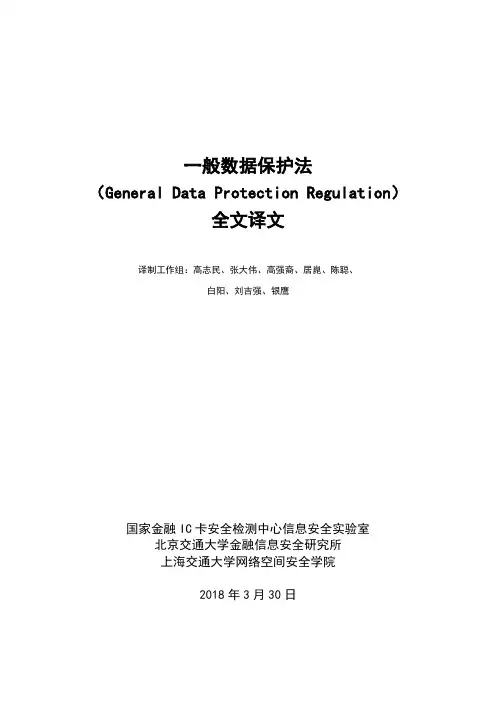
一般数据保护法(General Data Protection Regulation)全文译文译制工作组:高志民、张大伟、高强裔、居崑、陈聪、白阳、刘吉强、银鹰国家金融IC卡安全检测中心信息安全实验室北京交通大学金融信息安全研究所上海交通大学网络空间安全学院2018年3月30日《一般数据保护法案》General Data Protection RegulationREGULATION(EU)2016/679OF THE EUROPEAN PARLIAMENT AND OF THECOUNCIL of27April2016第一章.总则第1条主题与目标1该法规制定了在处理个人资料方面保护自然人的规则,及与个人资料自由流动有关的规则。
2本法规保护自然人的基本权利和自由,尤其是自然人保护其个人资料的权利。
3不得以保护与个人数据处理相关的自然人为由,限制或禁止个人数据在欧盟内部的自由流动。
第2条适用范围1本法规完全或部分适用于以自动方式对个人数据的处理,除了以自动方式处理构成或拟构成档案系统一部分的个人资料。
2本法不适用于以下个人数据的处理:a)在一项不属于欧盟法律范围活动的过程中;b)成员国在开展属于“欧盟条约(TEU,th e Treaty on European Union)”第五卷第2章范围内的活动时;c)自然人在纯粹的个人或家庭活动中;d)由主管当局以预防、调查、侦查或起诉刑事犯罪为目的;或执行的刑事处罚,包括防范和防止对公共安全的威胁。
3欧盟各机构、机关、办事处和专门行政部门(代理机构)处理个人数据,适用第45/2001号法规。
第45/2001号法规和其他适用于处理个人资料的欧盟法律应根据本法规第98条的规定对其进行调整。
4本法规不影响第2000/31/EC指令的适用,特别是该指令第12条至第15国家金融IC卡安全检测中心信息安全实验室、北京交通大学金融信息安全研究所、上海交通大学网络空间条对中间服务提供商的责任规则。
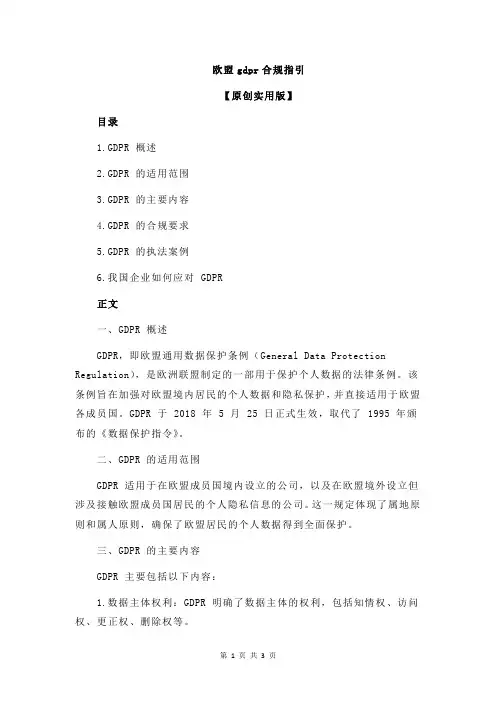
欧盟gdpr合规指引【原创实用版】目录1.GDPR 概述2.GDPR 的适用范围3.GDPR 的主要内容4.GDPR 的合规要求5.GDPR 的执法案例6.我国企业如何应对 GDPR正文一、GDPR 概述GDPR,即欧盟通用数据保护条例(General Data Protection Regulation),是欧洲联盟制定的一部用于保护个人数据的法律条例。
该条例旨在加强对欧盟境内居民的个人数据和隐私保护,并直接适用于欧盟各成员国。
GDPR 于 2018 年 5 月 25 日正式生效,取代了 1995 年颁布的《数据保护指令》。
二、GDPR 的适用范围GDPR 适用于在欧盟成员国境内设立的公司,以及在欧盟境外设立但涉及接触欧盟成员国居民的个人隐私信息的公司。
这一规定体现了属地原则和属人原则,确保了欧盟居民的个人数据得到全面保护。
三、GDPR 的主要内容GDPR 主要包括以下内容:1.数据主体权利:GDPR 明确了数据主体的权利,包括知情权、访问权、更正权、删除权等。
2.数据保护官员:GDPR 要求企业设立数据保护官员,负责企业的数据保护工作。
3.数据泄露通知:GDPR 规定,企业在发生数据泄露事件后 72 小时内需通知相关监管部门和数据主体。
4.数据保护影响评估:GDPR 要求企业在进行涉及个人数据的操作前,必须进行数据保护影响评估。
四、GDPR 的合规要求为确保企业符合 GDPR 的要求,企业需要采取以下措施:1.提升数据安全防护:企业需要确保数据存储、传输和处理的安全,防止数据泄露。
2.加强数据管理:企业应建立完善的数据管理制度,确保数据收集、使用、删除等环节的合规性。
3.提高员工意识:企业应培训员工,使其了解 GDPR 的规定,提高数据保护意识。
五、GDPR 的执法案例截止 2022 年 12 月,欧盟成员国已针对 GDPR 开出多张罚单,其中英国信息监管局对英国航空公司开出的罚款金额高达 1.83 亿英镑,是迄今为止最大的一笔 GDPR 罚款。
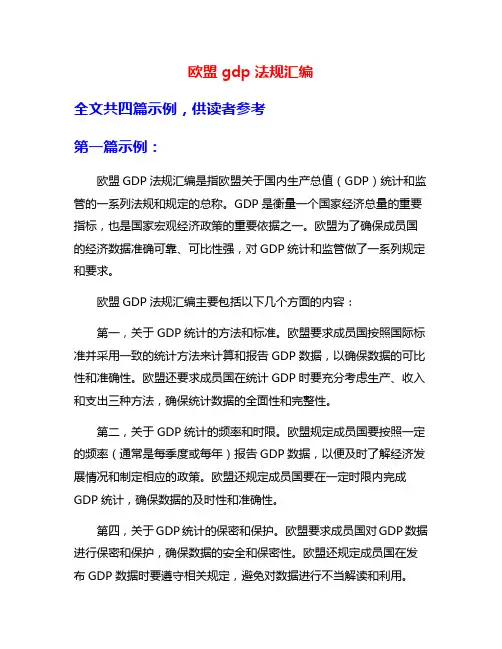
欧盟gdp法规汇编全文共四篇示例,供读者参考第一篇示例:欧盟GDP法规汇编是指欧盟关于国内生产总值(GDP)统计和监管的一系列法规和规定的总称。
GDP是衡量一个国家经济总量的重要指标,也是国家宏观经济政策的重要依据之一。
欧盟为了确保成员国的经济数据准确可靠、可比性强,对GDP统计和监管做了一系列规定和要求。
欧盟GDP法规汇编主要包括以下几个方面的内容:第一,关于GDP统计的方法和标准。
欧盟要求成员国按照国际标准并采用一致的统计方法来计算和报告GDP数据,以确保数据的可比性和准确性。
欧盟还要求成员国在统计GDP时要充分考虑生产、收入和支出三种方法,确保统计数据的全面性和完整性。
第二,关于GDP统计的频率和时限。
欧盟规定成员国要按照一定的频率(通常是每季度或每年)报告GDP数据,以便及时了解经济发展情况和制定相应的政策。
欧盟还规定成员国要在一定时限内完成GDP统计,确保数据的及时性和准确性。
第四,关于GDP统计的保密和保护。
欧盟要求成员国对GDP数据进行保密和保护,确保数据的安全和保密性。
欧盟还规定成员国在发布GDP数据时要遵守相关规定,避免对数据进行不当解读和利用。
第二篇示例:欧盟是由欧洲多个国家组成的政治和经济联盟,旨在促进成员国之间的经济合作与发展。
欧盟的GDP法规汇编是指欧盟成员国内部以及与欧盟相关的国际法规,涉及欧盟GDP的统计、监管和规范等方面的法律和条例。
欧盟GDP法规汇编包括了多个方面的内容,从GDP的计算方法到数据采集和处理的规定,再到对GDP统计结果的分析和使用等,都有相应的法规和规定。
欧盟统计局(Eurostat)是欧盟负责监管和执行GDP统计的机构,它不仅规范了各成员国的GDP统计方法,还对成员国提供统一的数据标准和指导。
在欧盟的GDP法规汇编中,有一些重要的法规和条例对于成员国的经济政策和发展具有重要的影响。
欧盟使用联邦制的GDP统计方法,即采用联邦公共机关和民间部门的数据进行GDP统计,以确保GDP数据的准确性和客观性。
欧盟GDPR对我国涉欧企业的合规挑战及对策随着欧盟实施《通用数据保护条例》(General Data Protection Regulation,GDPR),对我国企业在欧盟内的业务运营和数据处理产生重大影响。
该条例要求公司采取前瞻性安全策略保持个人数据的安全,并加强了其在隐私保护方面的监管。
对于我国涉欧企业而言,这意味着需要采取一系列措施来确保其在GDPR的限制下顺利经营并确保客户数据的隐私和保密。
首先,企业需要做好各种层面的调整,包括内部组织、流程、系统、技术等方面,以符合GDPR的要求。
例如,加强对员工数据保护意识的教育培训,建立清晰的数据处理程序,保证个人数据的收集和处理合法。
同时,对于在欧洲经营的企业需要重新审视其隐私政策是否符合GDPR的要求,严谨地对隐私声明进行修改,并确保信息的透明和明确。
第二,加强管理和风险控制,这需要涉欧企业从人员、技术、设备和网络等各方面提高保护水平。
针对数据泄露和其他安全事故,建立独立的安全和隐私监管机构,提高风险意识和危机应对能力。
同时,对于涉及到数据的合作伙伴,要求其也符合GDPR的要求,建立对数据的监管机制,遵守合规的数据处理流程。
第三,争取合作公正性和客户信任,涉欧企业应该积极参与GDPR指导下的数据合作、交换和共享,并提供客户友好的隐私保护策略。
企业需要综合考虑如何在数据保护的前提下开展数据业务,建立合规的数据处理流程,保证业务利益和个人隐私的兼顾。
总之,随着GDPR的实施,对于我国涉欧企业来说,从政策遵从、内部管理,以及与内外部合作伙伴的协调等方面都面临着巨大的挑战,企业应该完善现有体系和做好相关准备以应对挑战。
GDPR带来的新机遇和挑战,需要企业积极探索和应对,寻求真正合法、合规、有益于企业长远发展的道路。
欧盟《通用数据保护条例》合规指南E安全E安全5月29日讯欧盟《通用数据保护条列》(简称GDPR)于2018年5月25日正式生效。
英国一份政府调研显示,只有38%的英国公司在GDPR 生效前100天才开始关注该条例,许多美国公司也一样。
按照GDPR 的规定,企业违规可能会面临高达2000万欧元(约合人民币1。
28亿元)或企业全球年收入的4%的罚款(取两者中最高的)。
除了高额罚款,欧盟数据保护机构(DPA)可在必要时采取纠正处罚,例如禁止处理数据,并对常见的数据处理活动实施临时/确定性限制.因此,想要在欧洲市场立足的企业除了努力满足合规外别无他法。
满足GDPR 的要求,企业到底需要重点了解哪些信息?不少组织发现保障合规性远比预期的要复杂。
市场调查公司Propeller Insights 的一项调查显示,52%的受访企业认为将面临违规罚款。
不过,只要小型企业在实施GDPR 最佳实践方面做出显而易见实际努力,监管机构就可能会”宽大处理”。
不过,尽管如此,仍免不了高额罚款。
因此,满足GDPR 的合规性可谓任重道远。
一、数据控制者&数字处理者按照GDPR 第4条的第(7)点和第(8)点,数据控制者是能单独或联合决定个人数据的处理目的和方式的自然人、法人、公共机构、行政机关或其他非法人组织,负责决定处理个人数据的目的和方式,不过具体标准应以欧盟或其成员国的法律予以规定;数字处理者指为数据控制者处理个人数据的自然人、法人、公共机构、行政机关或其他非法人组织.但是,有时难以确定某个实体到底属于数据控制者还是处理者。
谷歌的复杂身份特例:当涉及包括AdMob、AdSense、AdWords、AdX 和DFP 在内的热门广告产品时,谷歌就是一个数据控制者;当涉及使用Google Analytics、Google attribution offering、Ads Data Hub和DoubleClick Bid Manager 等工具的消费者时,谷歌则是数据处理者;对于使用谷歌广告产品的广告发布商而言,谷歌仍是其收集数据的共同控制者,但是这些发布商收集数据必须征得用户同意.二、个人数据及数据保护原则根据GDPR 的定义,是指任何指向一个已识别或可识别的自然人(“数据主体”)的信息。
为何选择SGS如何应对GDPR 相关服务GDPR 介绍与欧盟国家做生意的我们应该如何准备?共创卓越管理GDPR介绍《通用数据保护条例》(GDPR)于2016年4月27日在欧盟官方刊物上发表。
暂缓期为二年,于2018年5月25日正式生效。
GDPR不同于其前身《数据保护指令95/46 / EC》,它不是一个指令而是一个法规。
这意味着它将直接生效并且应用到欧盟所有的成员国,因此可缩短实施时间并确保实现一致性。
如果您的公司无法符合GDPR, 就可能面临高达全球营业额的4%或2000万欧元的行政处罚(取两者之一更高)。
GDPR旨在:• 确立个人数据的保护是人权• 定义个人数据保护的原则和规章• 加强产品或服务提供者与他们所服务的人之间的信任个人的7个数据权利GDPR的核心内容是确立在处理个人资料的七项个人权利。
任何正在处理这些数据的组织都需要确保这些权利得到保护。
处理在GDPR中被定义为任何自动或手动操作,如收集、记录、组织、结构、存储、调整或变更、检索、咨询、使用、传输披露、传播或以其他方式提供、排列或组合、限制、删除或销毁。
GDPR包含以下内容:• 组织的需求(欧盟代表处,数据保护主任,同意记录之存档,合同要求,等等)。
• 个人的7个数据权利• 认证方案• 成员国监督• 建立欧盟数据保护委员会• 其他法律程序数据权利描述例子访问权允许个人索取本人资料的副本银行客户有权请求个人数据记录的副本,包括地址,电话等。
纠正权允许个人更改本人信息宽带客户有权要求ISP提供持有的信息,以更新他的联系电话。
删除权允许个人删除本人信息一位美容店的顾客有权要求他的信息被删除,因为他不再是商店的会员或者顾客,因此他不会被要求进行新的促销活动限用权除非法律相关需求,允许个人禁止本人信息被使用建筑师有权要求他的前任雇主在投标时不使用他的简历,但可保留他的名字在旧记录上,以记录法律责任。
可携权允许个人将本人信息从一个机构带到另一个机构保险客户有权要求将其个人资料转移到另一家保险公司。
GDPR–欧洲数据保护法规欧洲数据保护法规(GDPR)已成为全球数据保护领域最重要的法律之一。
GDPR的实施对各个行业都产生了重大影响。
本文将探讨GDPR的背景、重要特点以及不同行业的法规遵从要求,为读者解析GDPR对各行业的规范。
一、GDPR的背景和重要特点1. 背景介绍在互联网时代,个人信息泄露和滥用的问题日益突出,为解决这一问题,欧盟于2016年4月正式颁布了GDPR。
2. 适用范围GDPR适用于在欧盟境内运营的任何数据控制者和数据处理者,以及与欧盟居民交往中涉及其个人数据的任何非欧盟境内的组织。
3. 重要特点(1)个人数据保护:GDPR对个人数据进行全面保护,个人数据是指能够识别自然人身份的任何信息;(2)数据主体权利:GDPR赋予数据主体一系列权利,包括访问、更正、删除、限制处理等;(3)责任主体划分:GDPR明确了数据控制者和数据处理者之间的责任划分;(4)强制合规:GDPR设立了一系列罚则和处罚措施,确保组织遵守法规;(5)全球适用性:GDPR适用于全球范围内与欧盟居民交往中涉及其个人数据的组织。
二、不同行业的规范要求1. 金融业金融机构在处理和存储个人金融数据时,应确保数据安全性和机密性。
GDPR要求金融机构建立有效的数据保护措施,包括加强身份验证、使用加密技术保护数据传输和存储、明确数据访问权限等。
2. 医疗保健业医疗保健机构在处理个人健康数据时,必须严格遵守GDPR的要求。
医疗机构应采取措施保护个人隐私,包括控制数据访问权限、加强数据加密、确保数据传输的安全性等。
3. 电信业电信运营商和互联网服务提供商必须保护用户的通信数据和个人身份信息。
GDPR要求电信企业加强网络安全防护,包括监控、检测网络攻击,保护用户数据安全,以及设立数据保护官员等。
4. 零售业零售行业收集大量顾客数据,GDPR要求零售商必须明确告知顾客采集目的,并确保数据使用合法和透明。
此外,零售商还应采取技术和组织措施来保护个人数据的安全。
欧盟《一般数据保护条例》(GDPR)与中国应对吴沈括【期刊名称】《信息安全与通信保密》【年(卷),期】2018(000)006【总页数】5页(P12-16)【作者】吴沈括【作者单位】北京师范大学,北京 100875【正文语种】中文2018年5月25日,关于个人数据(个人信息)保护的欧盟新一代制度规范《一般数据保护条例》(以下简称:GDPR)将全面施行。
这是欧盟数据治理的里程碑事件,在信息系统和数字经济改造人类生活的时代大潮下,其超越成员国个别立法、统一个人数据保护路径、改变个人数据流转走向,进而深度修正欧盟数据治理的规范趋势,也将对全球数据治理生态产生广泛、深刻的影响。
对于我国各类主体(尤其包括网络企业)而言,首先需要正视的是,GDPR对于欧盟境外的数据治理格局所带来的重大发展。
尤其是其明确规定即使是欧盟境外的主体在特定条件下也必须遵循GDPR的相关规范,这在数字化业务乃至交易形式日趋多样化的技术背景下,迫使我们必须考虑、评估GDPR的适用可能性及其实际影响力。
1 GDPR的出台背景以及价值诉求自2012年1月GDPR文本浮出水面、2016年4月GDPR正式通过以来,欧盟委员会乃至欧盟内部经历了前所未见的游说博弈过程,反映了GDPR本身并非纯粹的个人数据规范,而是深层次融合了国际政治博弈、产业经济竞争以及社会文化扩张等诸多元素的复杂综合体。
究其直接目标和价值诉求而言,一方面,欧盟委员会公开宣称GDPR首先旨在建设现代化的个人数据治理规范机制、确保欧盟公民和居民对于自身个人数据享有充分的控制权,同时通过协调、简化现行的“数字单一市场”体系在欧盟体制内建设统一的规范框架进一步改善监管环境,以期降低个人数据处理主体的合规风控成本,进而助益包括跨国企业在内的商业主体的业务运营。
另一方面,在欧盟现行政策法律框架下,个人数据保护问题一贯被统摄于欧盟“数字单一市场”建设进程中,与其他元素共同服务于欧盟在数字经济中谋求世界级领袖地位的总体布局。
Guidelines 3/2018 on the territorial scope of the GDPR(Article 3)Version 2.012 November 2019Version historyContentsIntroduction (4)1 Application of the establishment criterion - Art 3(1) (5)2 Application of the targeting criterion – Art 3(2) (13)3 Processing in a place where Member State law applies by virtue of public international law (22)4 Representative of controllers or processors not established in the Union (23)The European Data Protection BoardHaving regard to Article 70 (1)(e) of the Regulation 2016/679/EU of the European Parliament and of the Council of 27 April 2016 on the protection of natural persons with regard to the processing of personal data and on the free movement of such data, and repealing Directive 95/46/EC.HAS ADOPTED THE FOLLOWING GUIDELINES:INTRODUCTIONThe territorial scope of General Data Protection Regulation1(the GDPR or the Regulation) is determined by Article 3 of the Regulation and represents a significant evolution of the EU data protection law compared to the framework defined by Directive 95/46/EC2. In part, the GDPR confirms choices made by the EU legislator and the Court of Justice of the European Union (CJEU) in the context of Directive 95/46/EC. However, important new elements have been introduced. Most importantly, the main objective of Article 4 of the Directive was to define which Member State’s national l aw is applicable, whereas Article 3 of the GDPR defines the territorial scope of a directly applicable text. Moreover, while Article 4 of the Directive made reference to the ‘use of equipment’ in the Union’s territory as a basis for bringing controllers wh o were “not established on Community territory” within the scope of EU data protection law, such a reference does not appear in Article 3 of the GDPR. Article 3 of the GDPR reflects the legislator’s intention to ensure comprehensive protection of the rights of data subjects in the EU and to establish, in terms of data protection requirement, a level playing field for companies active on the EU markets, in a context of worldwide data flows.Article 3 of the GDPR defines the territorial scope of the Regulation on the basis of two main criteria: the “establishment” criterion, as per Article 3(1), and the “targeting” criterion as per Article 3(2). Where one of these two criteria is met, the relevant provisions of the GDPR will apply to relevant processing of personal data by the controller or processor concerned. In addition, Article 3(3) confirms the application of the GDPR to the processing where Member State law applies by virtue of public international law.Through a common interpretation by data protection authorities in the EU, these guidelines seek to ensure a consistent application of the GDPR when assessing whether particular processing by a controller or a processor falls within the scope of the new EU legal framework. In these guidelines, the EDPB sets out and clarifies the criteria for determining the application of the territorial scope of the GDPR. Such a common interpretation is also essential for controllers and processors, both within and outside the EU, so that they may assess whether they need to comply with the GDPR for a given processing activity.As controllers or processors not established in the EU but engaging in processing activities falling within Article 3(2) are required to designate a representative in the Union, these guidelines will also provide 1 Regulation (EU) 2016/679 of the European Parliament and of the Council of 27 April 2016 on the protection of natural persons with regard to the processing of personal data and on the free movement of such data, and repealing Directive 95/46/EC (General Data Protection Regulation).2 Directive 95/46/EC of the European Parliament and of the Council of 24 October 1995 on the protection of individuals with regard to the processing of personal data and on the free movement of such data.clarification on the process for the designation of this representative under Article 27 and its responsibilities and obligations.As a general principle, the EDPB asserts that where the processing of personal data falls within the territorial scope of the GDPR, all provisions of the Regulation apply to such processing. These guidelines will specify the various scenarios that may arise, depending on the type of processing activities, the entity carrying out these processing activities or the location of such entities, and will detail the provisions applicable to each situation. It is therefore essential that controllers and processors, especially those offering goods and services at international level, undertake a careful and in concreto assessment of their processing activities, in order to determine whether the related processing of personal data falls under the scope of the GDPR.The EDPB underlines that the application of Article 3 aims at determining whether a particular processing activity, rather than a person (legal or natural), falls within the scope of the GDPR. Consequently, certain processing of personal data by a controller or processor might fall within the scope of the Regulation, while other processing of personal data by that same controller or processor might not, depending on the processing activity.These guidelines, initially adopted by the EDPB on 16 November, have been submitted to a public consultation from 23rd November 2018 to 18th January 2019 and have been updated taking into account the contributions and feedback received.1APPLICATION OF THE ESTABLISHMENT CRITERION - ART 3(1) Article 3(1) of the GDPR provides that the “Regulation applies to the processing of personal data in the context of the activities of an establishment of a controller or a processor in the Union, regardless of whether the processing takes place in the Union or not.”Article 3(1) GDPR makes reference not only to an establishment of a controller, but also to an establishment of a processor. As a result, the processing of personal data by a processor may also be subject to EU law by virtue of the processor having an establishment located within the EU.Article 3(1) ensures that the GDPR applies to the processing by a controller or processor carried out in the context of the activities of an establishment of that controller or processor in the Union, regardless of the actual place of the processing. The EDPB therefore recommends a threefold approach in determining whether or not the processing of personal data falls within the scope of the GDPR pursuant to Article 3(1).The following sections clarify the application of the establishment criterion, first by considering the definition of an ‘establishment’ in the EU within the meaning of EU data protection law, second by looking at what is meant by ‘processing in the context of the activities of an establishment in the Union’, and lastly by co nfirming that the GDPR will apply regardless of whether the processing carried out in the context of the activities of this establishment takes place in the Union or not.a)“An establishment in the Union”Before considering what is meant by “an establishment in the Union” it is first necessary to identify who is the controller or processor for a given processing activity. According to the definition in Article 4(7) of the GDPR, controller means “the natural or legal person, public authority, agency or other body which, alone or jointly with others, determines the purposes and means of the processing of personal data”. A processor, according to Article 4(8) of the GDPR, is “a natural or legal person, public a uthority,agency or other body which processes personal data on behalf of the controller”. As established by relevant CJEU case law and previous WP29 opinion3, the determination of whether an entity is a controller or processor for the purposes of EU data protection law is a key element in the assessment of the application of the GDPR to the personal data processing in question.While the notion of “main establishment” is defined in Article 4(16), the GDPR does not provide a definition of “establishment” for the purpose of Article 34. However, Recital 225clarifies that an “[e]stablishment implies the effective and real exercise of activities through stable arrangements. The legal form of such arrangements, whether through a branch or a subsidiary with a legal personality, is not the determining factor in that respect.”This wording is identical to that found in Recital 19 of Directive 95/46/EC, to which reference has been made in several CJEU rulings broadening the interpretation of the term “establishment”, departing from a formalistic approach whereby undertakings are established solely in the place where they are registered6. Indeed, the CJEU ruled that the notion of establishment extends to any real and effective activity —even a minimal one —exercised through stable arrangements7. In order to determine whether an entity based outside the Union has an establishment in a Member State, both the degree of stability of the arrangements and the effective exercise of activities in that Member State must be considered in the light of the specific nature of the economic activities and the provision of services concerned. This is particularly true for undertakings offering services exclusively over the Internet8. The threshold for “stable arrangement9” can actually be quite low when the centre of activities of a controller concerns the provision of services online. As a result, in some circumstances, the presence of one single employee or agent of a non-EU entity in the Union may be sufficient to constitute a stable arrangement (amounting to an ‘establishment’ for the purposes of Art 3(1)) if that employee or agent acts with a sufficient degree of stability. Conversely, when an employee is based in the EU but the processing is not being carried out in the context of the activities of the EU-based employee in the Union (i.e. the processing relates to activities of the controller outside the EU), the mere presence of an employee in the EU will not result in that processing falling within the scope of the GDPR.In other words, the mere presence of an employee in the EU is not as such sufficient to trigger the application of the GDPR, since for the processing in question to fall within the scope of the GDPR, it must also be carried out in the context of the activities of the EU-based employee.The fact that the non-EU entity responsible for the data processing does not have a branch or subsidiary in a Member State does not preclude it from having an establishment there within the 3 G 29 WP169 - Opinion 1/2010 on the concepts of "controller" and "processor", adopted on 16th February 2010 and under revision by the EDPB.4The definition of “main establishment” is mainly relevant for the purpose of determining the competence of the supervisory authorities concerned according to Article 56 GDPR. See the WP29 Guidelines for identifying a controller or processor’s lead supervisory authority (16/EN WP 244 rev.01) - endorsed by the EDPB.5 Recital 22 of the GDPR: “Any processing of personal data in the context of the activities of an establishment ofa controller or a processor in the Union should be carried out in accordance with this Regulation, regardless of whether the processing itself takes place within the Union. Establishment implies the effective and real exercise of activity through stable arrangements. The legal form of such arrangements, whether through a branch or a subsidiary with a legal personality, is not the determining factor in that respect.”6 See in particular Google Spain SL, Google Inc. v AEPD, Mario Costeja González (C-131/12), Weltimmo v NAIH (C-230/14), Verein für Konsumenteninformation v Amazon EU (C-191/15) and Wirtschaftsakademie Schleswig-Holstein (C-210/16).7 Weltimmo, paragraph 31.8 Weltimmo, paragraph 29.9 Weltimmo, paragraph 31.meaning of EU data protection law. Although the notion of establishment is broad, it is not without limits. It is not possible to conclude that the non-EU entity has an establishment in the Union merely because the undertaking’s website is accessible in the Union10.Once it is concluded that a controller or processor is established in the EU, an in concreto analysis should then follow to determine whether the processing in question is carried out in the context of the activities of this establishment, in order to determine whether Article 3(1) applies. If a controller or processor established outside the Union exercises “a real and effective activity - even a minimal one” - through “stable arrangements”, regardless of its legal form (e.g. subsidiar y, branch, office…), in the territory of a Member State, this controller or processor can be considered to have an establishment in that Member State11. It is therefore important to consider whether the processing of personal data takes place “in the context of the activities of” such an establishment as highlighte d in Recital 22.b)Processing of personal data carried out “in the context of the activities of” anestablishmentArticle 3(1) confirms that it is not necessary that the processing in question is carried out “by” the relevant EU establishment itself; the controller or processor will be subject to obligations under the GDPR whenever the processing is carried out ”in the context of the activities”of its relevant establishment in the Union. The EDPB recommends that determining whether processing is being carried out in the context of an establishment of the controller or processor in the Union for the purposes of Article 3(1) should be carried out on a case-by-case basis and based on an analysis in concreto. Each scenario must be assessed on its own merits, taking into account the specific facts of the case.The EDPB considers that, for the purpose of Article 3(1), the meaning of “processing in the context of the activities of an establishment of a controller or a processor” is to be understood in light of the relevant case law. On the one hand, with a view to fulfilling the objective of ensuring effective and complete protection, the meaning of “in the context of the activities of an establishment” cannot be interpreted restrictively12. On the other hand, the existence of an establishment within the meaning of the GDPR should not be interpreted too broadly to conclude that the existence of any presence in the EU with even the remotest links to the data processing activities of a non-EU entity will be sufficient to bring this processing within the scope of EU data protection law. Some commercial activity carried out by a non-EU entity within a Member State may indeed be so far removed from the processing of 10CJEU, Verein für Konsumenteninformation v. Amazon EU Sarl, Case C‑191/15, 28 July 2016, paragraph 76 (hereafter “Verein für Konsumenteninformation”).11 See in particular para 29 of the Weltimmo judgment, which emphasizes a flexible definition of the concept of 'establishment' and clarifies that 'the degree of stability of the arrangements and the effective exercise of activities in that other Member State must be interpreted in the light of the specific nature of the economic activities and the provision of services concerned.'12 Weltimmo, paragraph 25 and Google Spain, paragraph 53.personal data by this entity that the existence of the commercial activity in the EU would not be sufficient to bring the data processing by the non-EU entity within the scope of EU data protection law13.Consideration of the following two factors may help to determine whether the processing is being carried out by a controller or processor in the context of its establishment in the Unioni) Relationship between a data controller or processor outside the Union and its localestablishment in the UnionThe data processing activities of a data controller or processor established outside the EU may be inextricably linked to the activities of a local establishment in a Member State, and thereby may trigger the applicability of EU law, even if that local establishment is not actually taking any role in the data processing itself14. If a case by case analysis on the facts shows that there is an inextricable link between the processing of personal data carried out by a non-EU controller or processor and the activities of an EU establishment, EU law will apply to that processing by the non-EU entity, whether or not the EU establishment plays a role in that processing of data15.ii) Revenue raising in the UnionRevenue-raising in the EU by a local establishment, to the extent that such activities can be considered as “inextricably linked” to the processing of personal data taking place outside the EU and individuals in the EU, may be indicative of processing by a non-EU controller or processor being carried out “in the context of the activities of the EU establishment”, and may be sufficient to result in the application of EU law to such processing16.The EDPB recommends that non-EU organisations undertake an assessment of their processing activities, first by determining whether personal data are being processed, and secondly by identifying potential links between the activity for which the data is being processed and the activities of any presence of the organisation in the Union. If such a link is identified, the nature of this link will be key in determining whether the GDPR applies to the processing in question, and must be assessed inter alia against the two elements listed above.13 G29 WP 179 update - Update of Opinion 8/2010 on applicable law in light of the CJEU judgment in Google Spain, 16th December 201514 CJEU, Google Spain, Case C‑131/1215 G29 WP 179 update - Update of Opinion 8/2010 on applicable law in light of the CJEU judgment in Google Spain, 16th December 201516This may potentially be the case, for example, for any foreign operator with a sales office or some other presence in the EU, even if that office has no role in the actual data processing, in particular where the processing takes place in the context of the sales activity in the EU and the activities of the establishment are aimed at the inhabitants of the Member States in which the establishment is located (WP179 update).c)Application of the GDPR to the establishment of a controller or a processor in theUnion, regardless of whether the processing takes place in the Union or notAs per Article 3(1), the processing of personal data in the context of the activities of an establishment of a controller or a processor in the Union triggers the application of the GDPR and the related obligations for the data controller or processor concerned.The text of the GDPR specifies that the Regulation applies to processing in the context of the activities of an establishment in the EU “regardless of whether the processing takes place in the Union or not”. It is the presence, through an establishment, of a data controller or processor in the EU and the fact that a processing takes place in the context of the activities of this establishment that trigger the application of the GDPR to its processing activities. The place of processing is therefore not relevant in determining whether or not the processing, carried out in the context of the activities of an EU establishment, falls within the scope of the GDPR.In determining the territorial scope of the GDPR, geographical location will be important under Article 3(1) with regard to the place of establishment of:-the controller or processor itself (is it established inside or outside the Union?);-any business presence of a non-EU controller or processor (does it have an establishment in the Union?)However, geographical location is not important for the purposes of Article 3(1) with regard to the place in which processing is carried out, or with regard to the location of the data subjects in question.The text of Article 3(1) does not restrict the application of the GDPR to the processing of personal data of individuals who are in the Union. The EDPB therefore considers that any personal data processing in the context of the activities of an establishment of a controller or processor in the Union would fall under the scope of the GDPR, regardless of the location or the nationality of the data subject whose personal data are being processed. This approach is supported by Recital 14 of the GDPR which states that “[t]he protection afforded by this Regulation should apply to natural persons, whatever their nationality or place of residence, in relation to the processing of their personal data.”d)Application of the establishment criterion to controller and processorAs far as processing activities falling under the scope of Article 3(1) are concerned, the EDPB considers that such provisions apply to controllers and processors whose processing activities are carried out in the context of the activities of their respective establishment in the EU. While acknowledging that the requirements for establishing the relationship between a controller and a processor17 does not vary depending on the geographical location of the establishment of a controller or processor, the EDPB takes the view that when it comes to the identification of the different obligations triggered by the applicability of the GDPR as per Article 3(1), the processing by each entity must be considered separately.The GDPR envisages different and dedicated provisions or obligations applying to data controllers and processors, and as such, should a data controller or processor be subject to the GDPR as per Article 3(1), the related obligations would apply to them respectively and separately. In this context, the EDPB notably deems that a processor in the EU should not be considered to be an establishment of a data controller within the meaning of Article 3(1) merely by virtue of its status as processor on behalf of a controller.The existence of a relationship between a controller and a processor does not necessarily trigger the application of the GDPR to both, should one of these two entities not be established in the Union. An organisation processing personal data on behalf of, and on instructions from, another organisation (the client company) will be acting as processor for the client company (the controller). Where a processor is established in the Union, it will be required to comply with the obligations imposed on17 In accordance with Article 28, the EDPB recalls that processing activities by a processor on behalf of a controller shall be governed by a contract or other legal act under Union or Member State law, that is binding on the processor with regard to the controller, and that controllers shall only use processors providing sufficient guarantees to implement appropriate measures in such manner that processing will meet the requirement of the GDPR and ensure the protection of data subjects’ rights.processors by the GDPR (the ‘GDPR processor obligations’). If the controller instructing the processor is also located in the Union, that controller will be required to comply with the obligations imposed on controllers by the GDPR (the ‘GDPR controller obligations’). Processing activity which, when carried out by a controller, falls within the scope of the GDPR by virtue of Art 3(1) will not fall outside the scope of the Regulation simply because the controller instructs a processor not established in the Union to carry out that processing on its behalf.i) Processing by a controller established in the EU instructing a processor not established in theUnionWhere a controller subject to GDPR chooses to use a processor located outside the Union for a given processing activity, it will still be necessary for the controller to ensure by contract or other legal act that the processor processes the data in accordance with the GDPR. Article 28(3) provides that the processing by a processor shall be governed by a contract or other legal act. The controller will therefore need to ensure that it puts in place a contract with the processor addressing all the requirements set out in Article 28(3). In addition, it is likely that, in order to ensure that it has complied with its obligations under Article 28(1) – to use only a processor providing sufficient guarantees to implement measures in such a manner that processing will meet the requirements of the Regulation and protect the rights of data subjects – the controller may need to consider imposing, by contract, the obligations placed by the GDPR on processors subject to it. That is to say, the controller would have to ensure that the processor not subject to the GDPR complies with the obligations, governed by a contract or other legal act under Union or Member State law, referred to Article 28(3).The processor located outside the Union will therefore become indirectly subject to some obligations imposed by controllers subject to the GDPR by virtue of contractual arrangements under Article 28. Moreover, provisions of Chapter V of the GDPR may apply.ii) Processing in the context of the activities of an establishment of a processor in the UnionWhilst case law provides us with a clear understanding of the effect of processing being carried out in the context of the activities of an EU establishment of the controller, the effect of processing being carried out in the context of the activities of an EU establishment of a processor is less clear.The EDPB emphasises that it is important to consider the establishment of the controller and processor separately when determining whether each party is of itself ‘established in the Union’.The first question is whether the controller itself has an establishment in the Union, and is processing in the context of the activities of that establishment. Assuming the controller is not considered to be processing in the context of its own establishment in the Union, that controller will not be subject to GDPR controller obligations by virtue of Article 3(1) (although it may still be caught by Article 3(2)). Unless other factors are at play, the processor’s EU establishment will not be considered to be an establishment in respect of the controller.The separate question then arises of whether the processor is processing in the context of its establishment in the Union. If so, the processor will be subject to GDPR processor obligations under Article 3(1). However, this does not cause the non-EU controller to become subject to the GDPR controller obligation s. That is to say, a “non-EU” controller (as described above) will not become subject to the GDPR simply because it chooses to use a processor in the Union.By instructing a processor in the Union, the controller not subject to GDPR is not carrying out processing “in the context of the activities of the processor in the Union”. The processing is carried out in the context of the controller’s own activities; th e processor is merely providing a processing service18 which is not “inextricably linked” to the activities of the controller. As stated above, in the case of a data processor established in the Union and carrying out processing on behalf of a data controller established outside the Union and not subject to the GDPR as per Article 3(2), the EDPB considers that the processing activities of the data controller would not be deemed as falling under the territorial scope of the GDPR merely because it is processed on its behalf by a processor established in the Union. However, even though the data controller is not established in the Union and is not subject to the provisions of the GDPR as per Article 3(2), the data processor, as it is established in the Union, will be subject to the relevant provisions of the GDPR as per Article 3(1).When it comes to a data processor established in the Union carrying out processing on behalf of a data controller with no establishment in the Union for the purposes of the processing activity and which does not fall under the territorial scope of the GDPR as per Article 3(2), the processor will be subject to the following relevant GDPR provisions directly applicable to data processors:-The obligations imposed on processors under Article 28 (2), (3), (4), (5) and (6), on the duty to enter into a data processing agreement, with the exception of those relating to the assistance to the data controller in complying with its (the controller’s) own obligations under the GDPR.-The processor and any person acting under the authority of the controller or of the processor, who has access to personal data, shall not process those data except on instructions from the controller, unless required to do so by Union or Member State law, as per Article 29 and Article 32(4).-Where applicable, the processor shall maintain a record of all categories of processing carried out on behalf of a controller, as per Article 30(2).18 The offering of a processing service in this context cannot be considered either as an offer of a service to data subjects in the Union.。